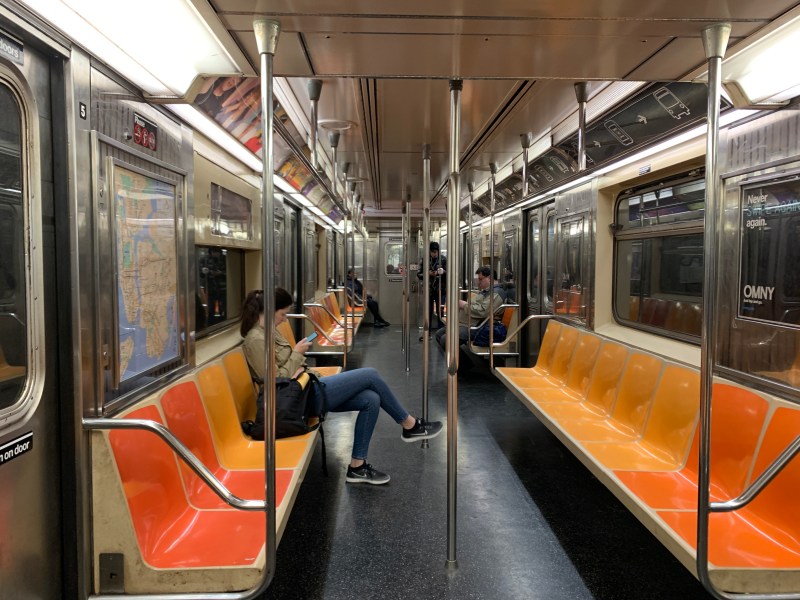Advocates: MTA’s Finance Quick Fix Should Not Become Permanent

This story was written before state legislators gathered to vote on the budget. It will be updated in the morning.
State budget negotiators are considering touching the ultimate third-rail of MTA funding — raiding revenue sources that are earmarked for capital improvements — in order to maintain day-to-day operations during the a ridership and fiscal collapse caused by COVID-19.
Streetsblog has learned said that budget negotiations now apparently include opening the capital funding “lockbox” containing money the agency was counting on for its 2020-2024 capital plan and using it to prop up the cash-strapped agency’s operating funding. The 11th-hour suggestion has arisen as the MTA tries to determine how to stop bleeding money while ridership drops amidst efforts to keep everyone but essential workers from riding the subway.
“The MTA has to be asking what are the best of the bad decisions they have to make to remain solvent?” said Reinvent Albany Senior Analyst Rachael Fauss, warning that the $4 billion that the MTA did get from the federal government could potentially only last a few months before that bailout is exhausted.
According to a draft summary of the state budget that Reinvent Albany has seen, an emergency lockbox provision is being considered before the budget, due on April 1, is approved by legislators. Reinvent Albany said the provision “would give the MTA more flexibility in how it uses revenue from the Internet Sales and Mansion Tax and planned Central Business District tolling.” The MTA was originally set to borrow $25 billion against that revenue to pay for almost half of the $51 billion 2020-2024 capital plan. Diverting some of that money to the agency’s operating budget then, is an idea that transit advocates see as painful, even if it might be necessary at the moment.
The best argument in favor of shifting money from the capital program is simply that the MTA is hanging on the edge of an unprecedented fiscal cliff, thanks to the coronavirus pandemic, and the agency needs to be able to move fast to save itself from going belly up.
“Given that they are in such distress, it’s good to have flexibility,” said Ben Fried, the communications director at the TransitCenter.
The MTA is losing $125 million per week in the face of a 90-percent ridership drop on the subways alone, a revenue situation the agency can’t hope to fix while it encourages people to stay off of mass transit (and, indeed, fewer people are commuting to jobs). When the state and local economies begin to recover from the pandemic, government will need to find money to make the MTA whole again, Fried said. But the emergency fix could work — as long as the “capital raid” provision is actually legislated as an emergency move, with perhaps a sunset provision on when the agency must stop drawing down the lockbox money, he said.
Ben Kabak, who runs the transit-focused Second Avenue Sagas blog, also said that the move was not ideal but was also probably “unavoidable.”
“Raiding the capital lockbox and re-allocating city contributions to the capital plan to cover the current ongoing loss of operating revenue isn’t what you want to see in year 1 of a $51-billion five-year plan, but it’s likely unavoidable at this point,” he tweeted in response to the news.
Raiding the capital lockbox and re-allocating city contributions to the capital plan to cover the current ongoing loss of operating revenue isn't what you want to see in year 1 of a $51 billion five-year plan, but it's likely unavoidable at this point. https://t.co/sAfGxVovIW
— Second Ave. Sagas (@2AvSagas) March 31, 2020
But in the same way that Immortan Joe once warned his subjects to not become addicted to water, advocates are warning that the state can’t rely on the MTA’s dedicated capital funding to fill future operating budget holes. Failure to heed that advice could lead to New York emulating the worst habits of its next door neighbor, New Jersey.
“If you look at New Jersey Transit, they’ve been pushing their money from their capital budget to their operating budget for decades now,” said Nick Sifuentes, the executive director at the Tri-State Transportation Campaign, “and the end result has been the state not being able to finish big capital projects.”
The Garden State’s habit of pulling transit capital funding into the NJT operating budget has resulted in billions of dollars taken away from capital projects and a system that still relies so much on old train cars and equipment that it was called “a cautionary tale of neglect” by the New York Times in 2016. Sifuentes said that NJT’s initial practice of patching operating deficits with capital funding started small, but grew over the years and became a habit that was impossible to break as it became normalized, a situation the MTA and New York State can’t repeat.
Without a sunset provision or clear guidance that this is a one-time solution “there’s risk that a future governor or legislators could arrive at the conclusion that we started doing this, so why stop it? It’s harder to restore cuts and fix them when it becomes the status quo,” Sifuentes said.
The MTA declined to comment for this story.